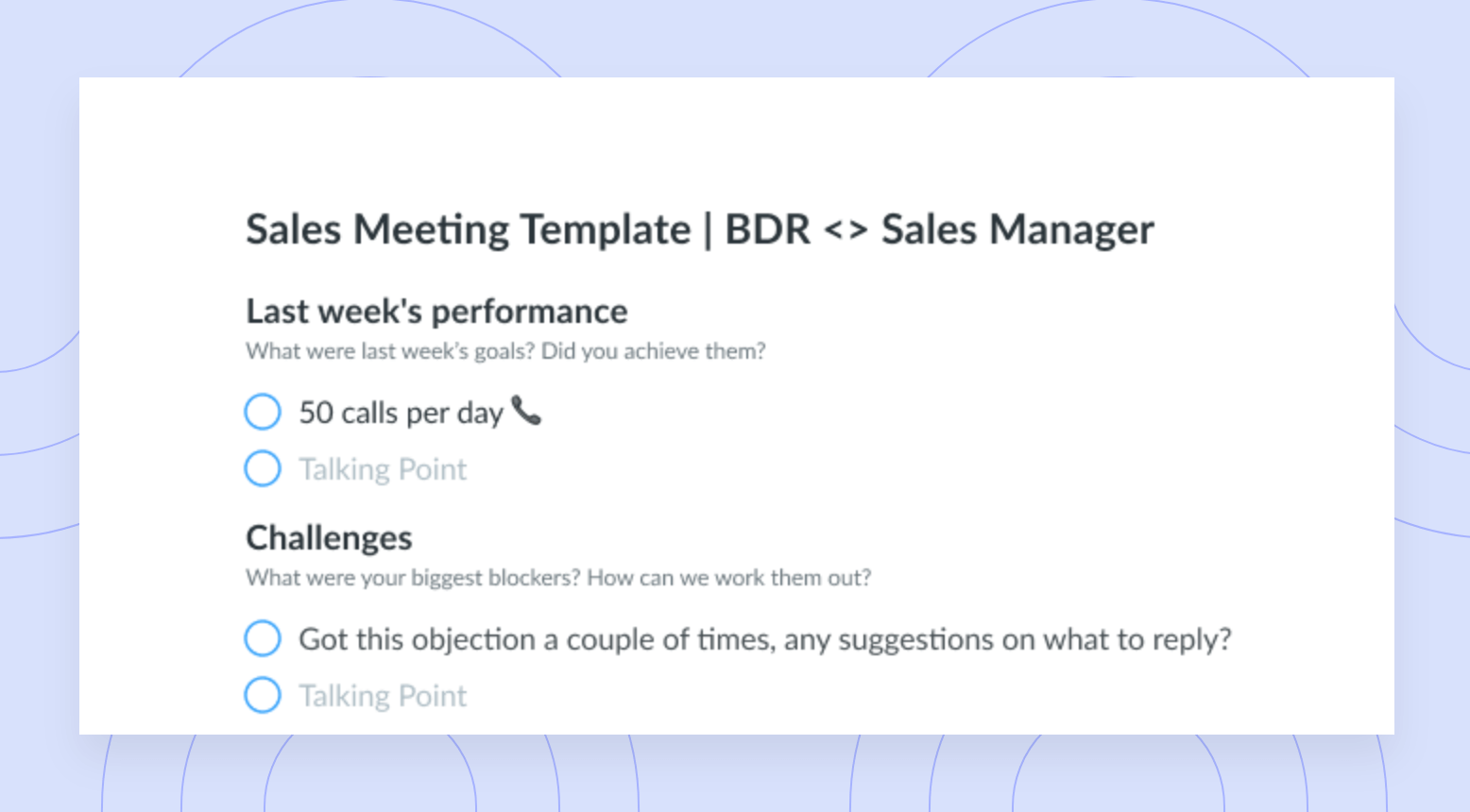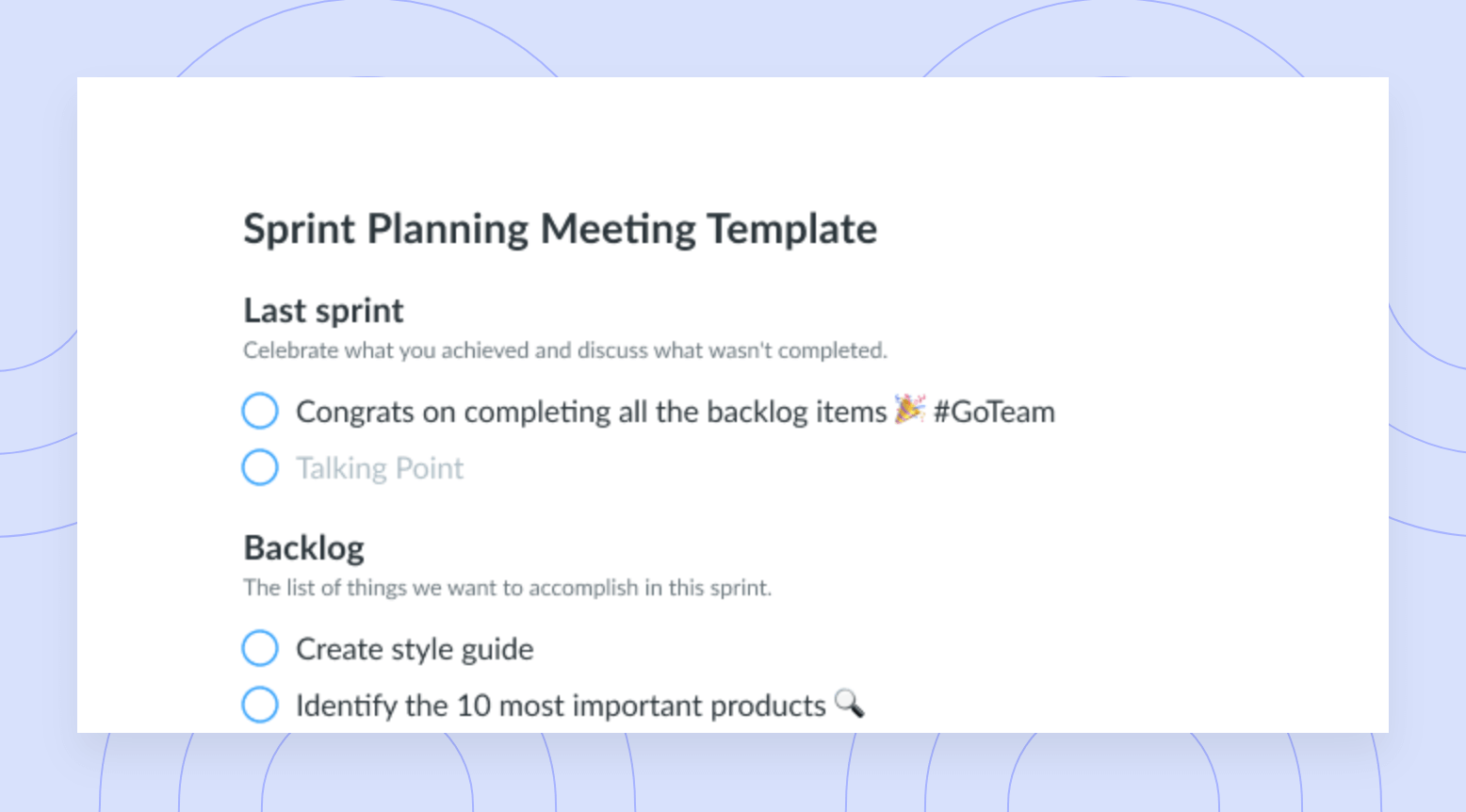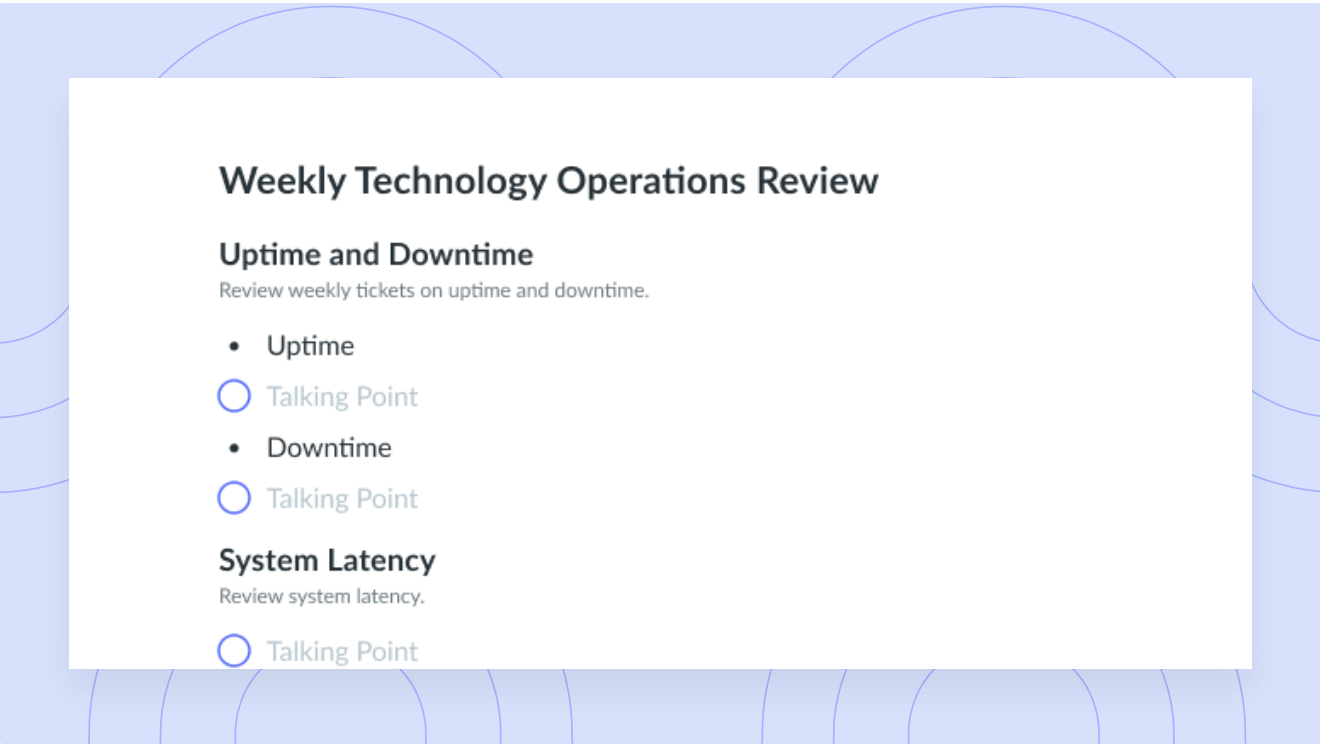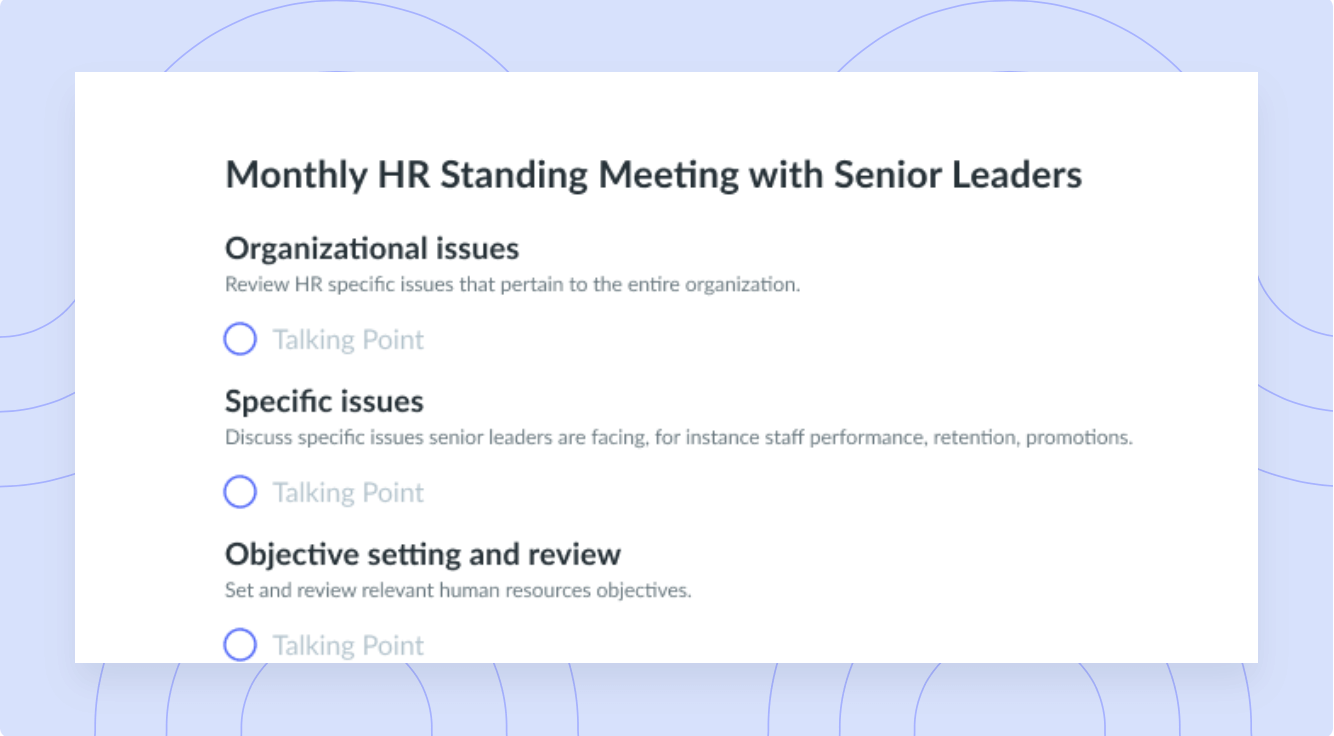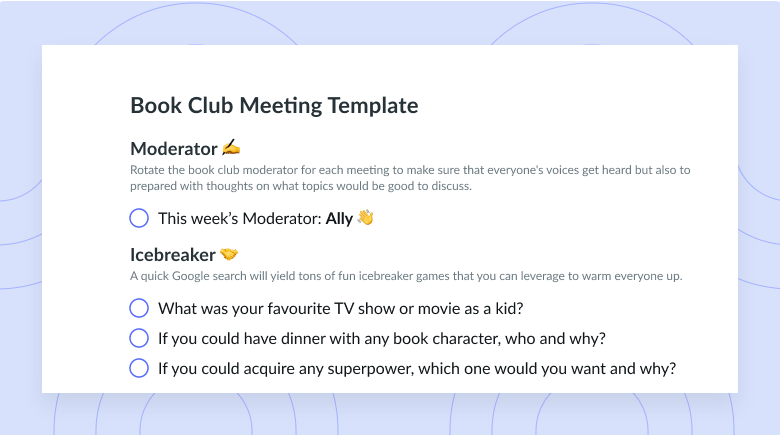10 Expert Tips for Effective and Meaningful One-on-One Meetings
Here's how top leaders at the New York Times, EDC, Context Leap, Alyce, Bonsai, Localised and more are running effective one-on-one meetings, promoting engagement, and instilling trust.
The one-on-one meeting is arguably one of the most important meetings that you can have with your employees. It’s a time that should be dedicated to listening and understanding how your employees are doing and feeling in their current role with the organization. It’s an opportunity to build a stronger relationship and to establish trust.
In order to help you and your team plan and execute great one-on-one meetings, we asked a panel of experts for their advice and best practices to keep your team engaged and excited about one-on-ones.
Here are ten expert tips from our #ManagerChats on the topic of effective and meaningful one-on-one meetings:
- Leverage the benefits of one-on-one meetings
- Schedule a recurring meeting
- Prepare an agenda in advance
- Avoid status updates
- Explain the value of one-on-ones to your team
- Talk about career development
- Don’t cancel or skip them
- Empower your direct report
- Share constructive feedback
- Leave every meeting with clear takeaways
1 Leverage the benefits of one-on-one meetings
There’s a lot of benefits associated with one-on-one meetings with direct reports. You have the opportunity to build trust with your team and show your group that you’re there to support them through their many endeavours. When managers get in the habit of regularly scheduled one-on-one meetings, they begin to build a stronger rapport and relationship with their employees.
Founder of Context Leap, Melissa Hui, who is based in San Francisco, highlights that when you firmly schedule your one-on-ones, you prove your commitment to growing with your team:
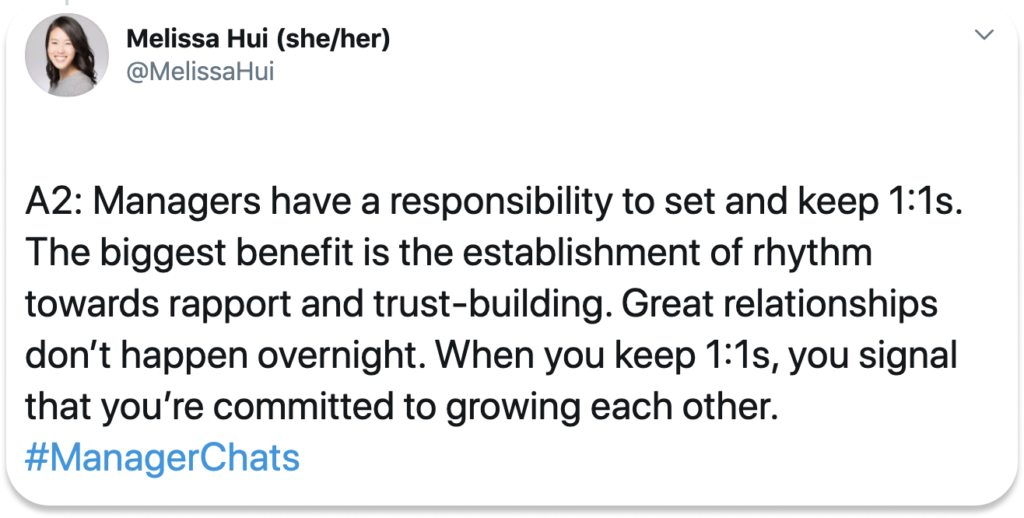
Brand marketer, Sarah Pion of Alyce, points out another important benefit of one-on-ones: Employees using this time for their own benefit.
One-on-one meetings are a dedicated time where employees can talk to their manager about anything that’s important to them, including how to get more out of their current position:
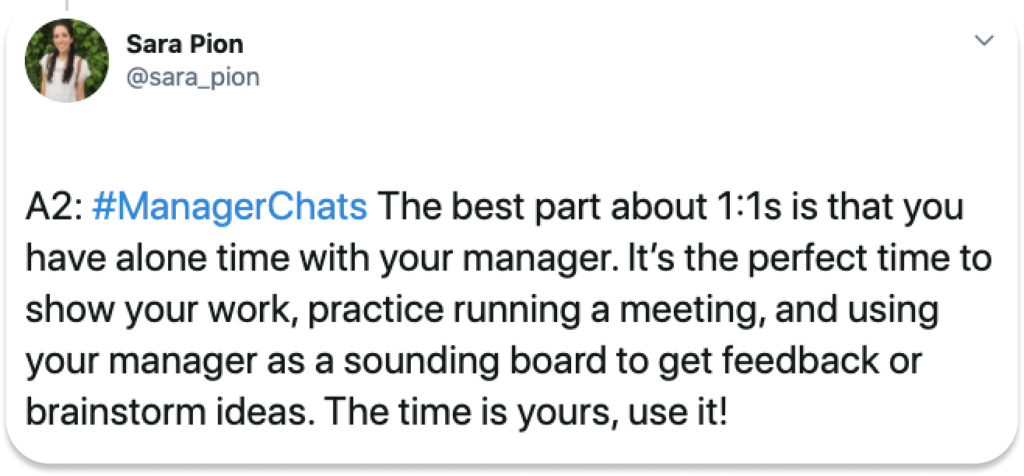
One-on-one meetings with staff are a good opportunity to check in with how your team is doing, overall. In more stressful or more difficult times, it’s even more important to take the time to understand how your team members are being affected.
Tara Sutorius, Director of External Communications at Export Development Canada (EDC), comments on how important it has been to check in with her team during the Coronavirus pandemic and the benefits that have surfaced as a result:
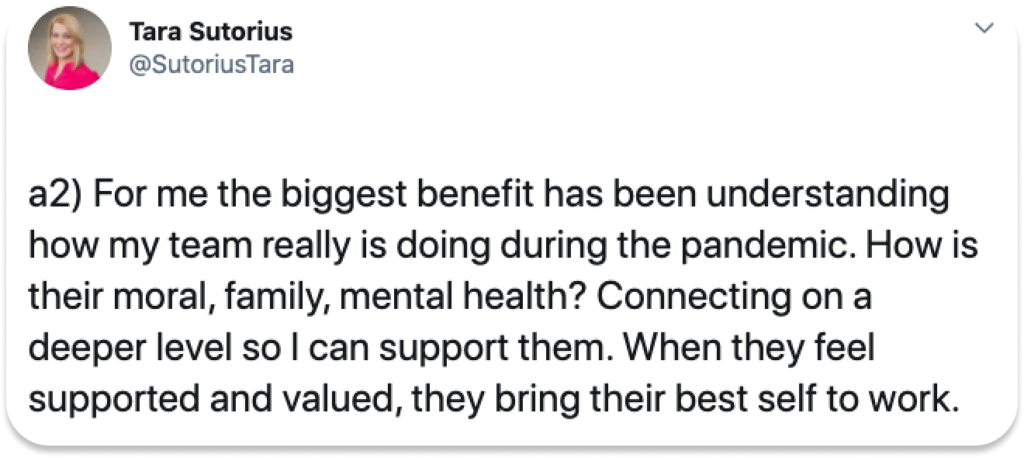
2 Schedule a recurring meeting
Having a one-on-one meeting is great, but it sort of defeats its purpose to treat it like a one-off. In order for one-on-one meetings to be effective, they need to be recurring. How often?
Leadership coach, speaker and author Kristi Hedges suggests to schedule your one-on-one meetings weekly or bi-weekly. Take a look at her suggested structure:
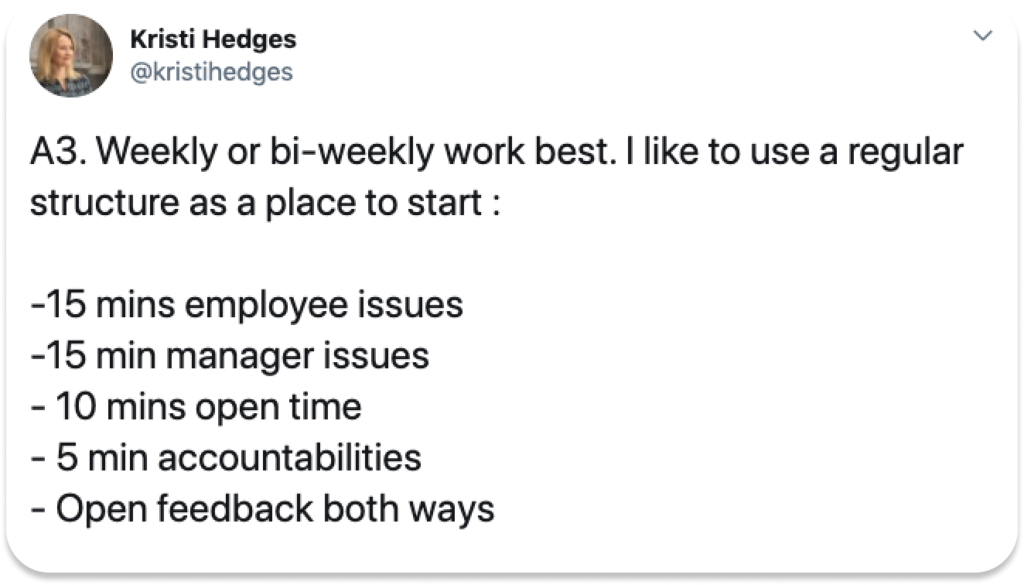
Emma Hunt, Head of People at Bonsai shares that she prefers a weekly one-on-one meeting with employees but explains that the recurring meeting should be mutually agreed so that both parties are happy:
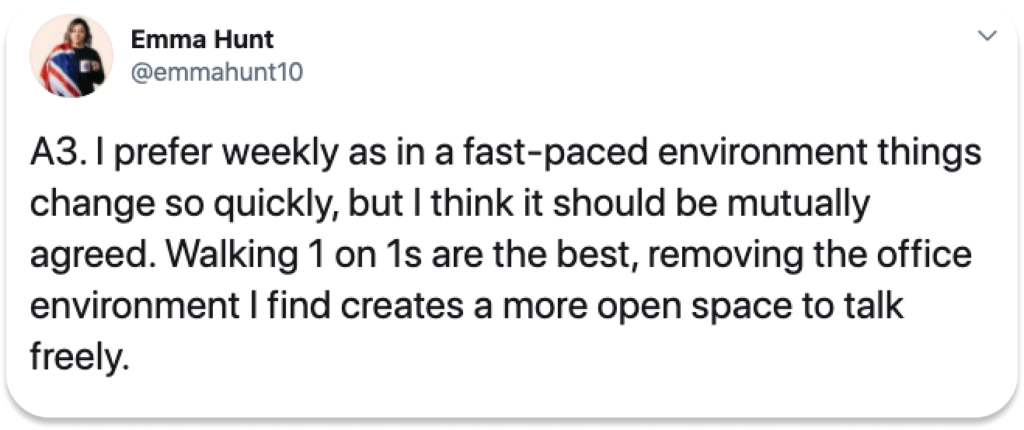
The frequency of the one-on-one meeting can depend on numerous factors, which is reinforced by Executive coach Jason R. Waller.
He highlights the importance of collaboration when it comes to scheduling these meetings:
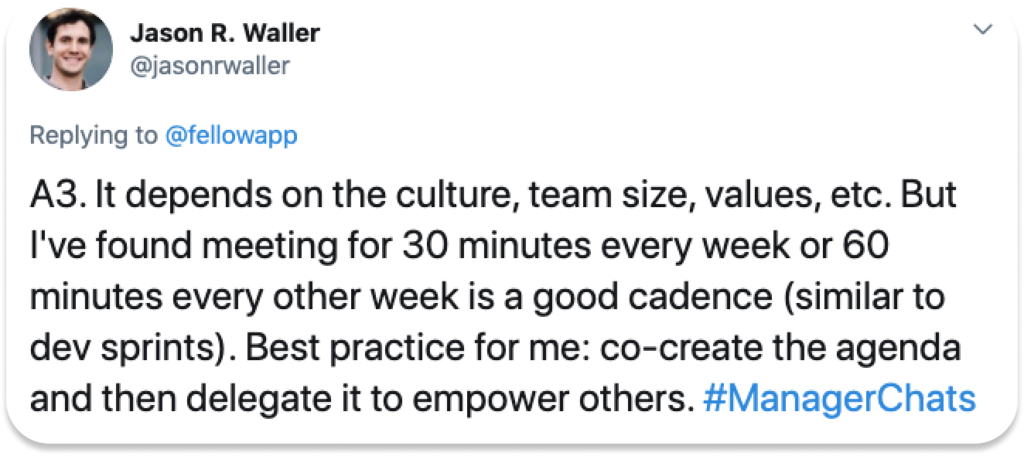
Download the definitive guide to 1-on-1s
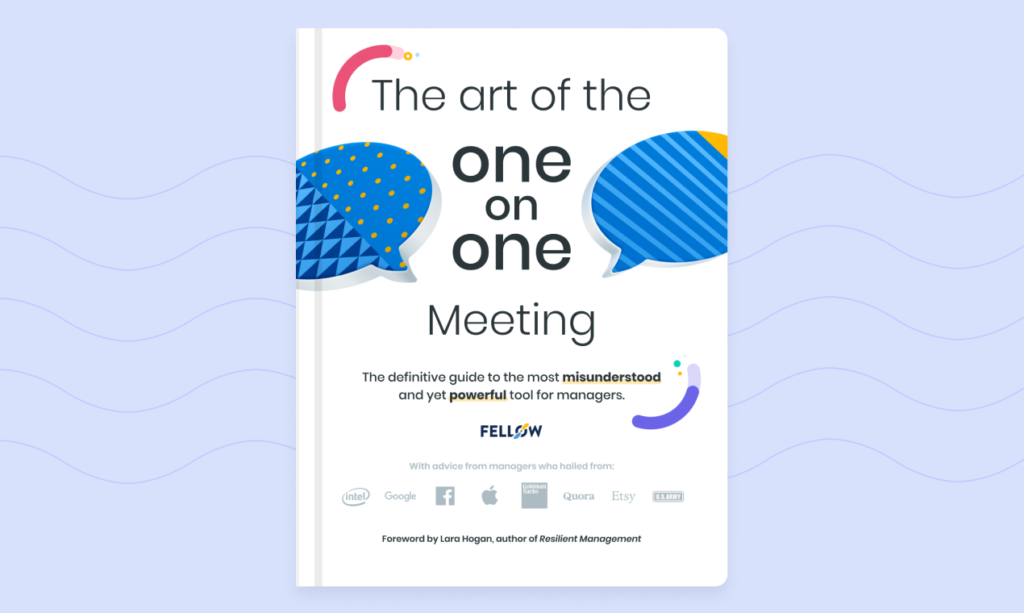
3 Prepare an agenda in advance
It’s super important to prepare an agenda in advance of your one-on-one meeting. This is going to save you a lot of time and energy, while keeping you organized and in the know. It’s also going to feel good to collaborate with your employees to create a list of topics or ideas to discuss.
Melissa from Context Leap suggests preparing the agenda in advance as a digital document that is continuously updated:
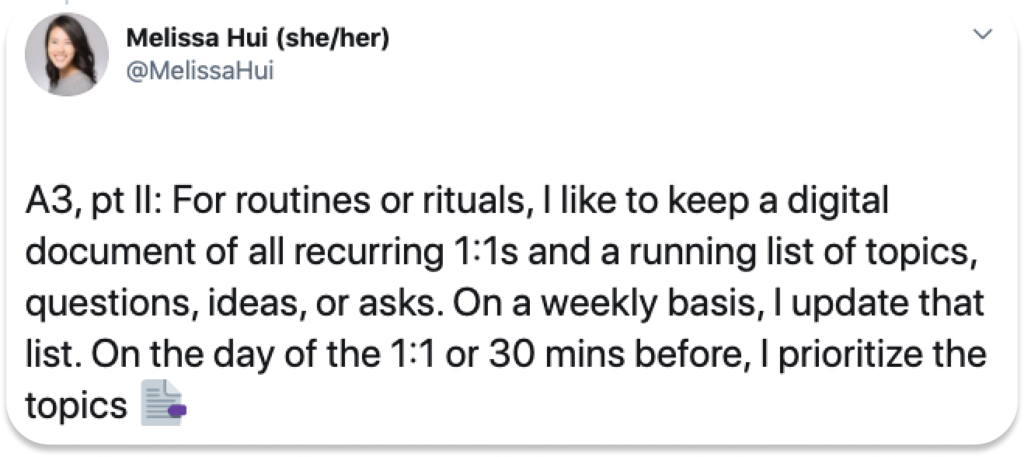
Jordan Scheltgen, Founder of Cave Social has a great way of having his agenda prepared in advance. He asks his team members to arrive at their one-on-one meeting with questions prepared to ask him and he does the same.
Predetermining the content of the meeting is going to keep you focused on topics that matter and save your valuable time:
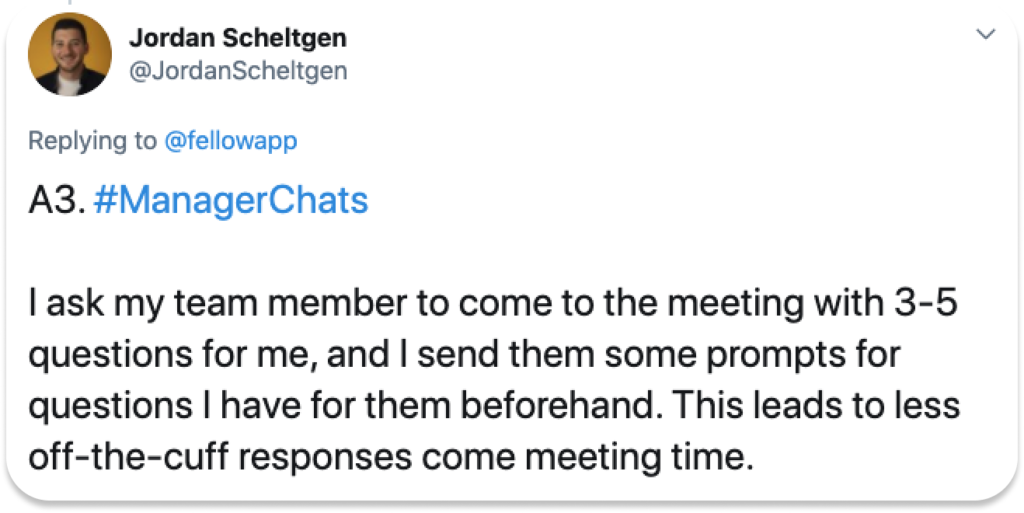
4 Avoid status updates and project management conversations
One-on-one meetings are not meant to provide any status updates or project management conversations. Avoid steering the conversation in any direction, other than one that focuses on your employee and how they’re doing.
Lauren Currie, CEO and Founder of Stride and Founder of Upfront suggests these 4 questions to open your meeting:
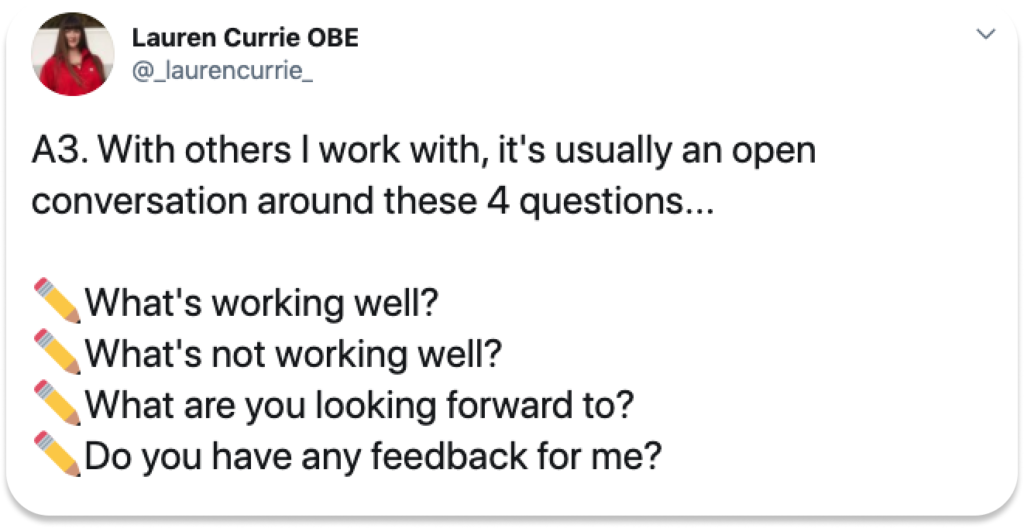
Suzi Archer, Head of Talent from MyCleverGroup, gives some great example of questions that employees can ask during their one-on-ones:
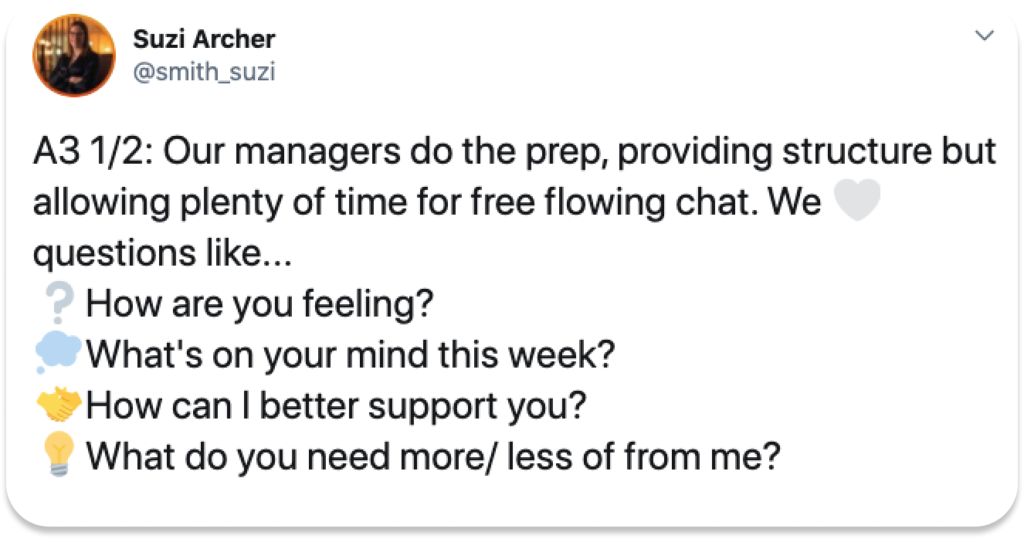
Danielle Leong, Engineer Manager at Github, photographer, trust and safety consultant suggests using your one-on-one time with your employees to work on their career aspirations and exchange feedback:
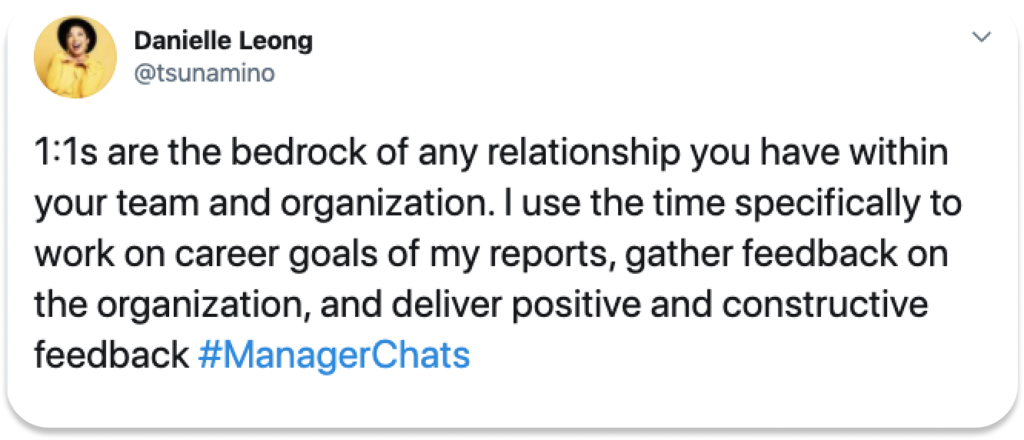

Pro Tip
Say good-bye to awkward silences and status updates. Fellow’s library of 200+ suggested questions and pre-built templates will help you maintain consistency and spark engaging conversations.

5 Explain the value of one-on-ones to your team
If there isn’t an obvious benefit to attending a meeting, employees probably won’t be too enthusiastic about committing. This is why it’s important that you explain the value of one-on-one meetings to your team.
Bruce Tulgan Author, Speaker, and Consultant, as well as the Founder and CEO of RainmakerThinking, suggests highlighting the value of these meetings:
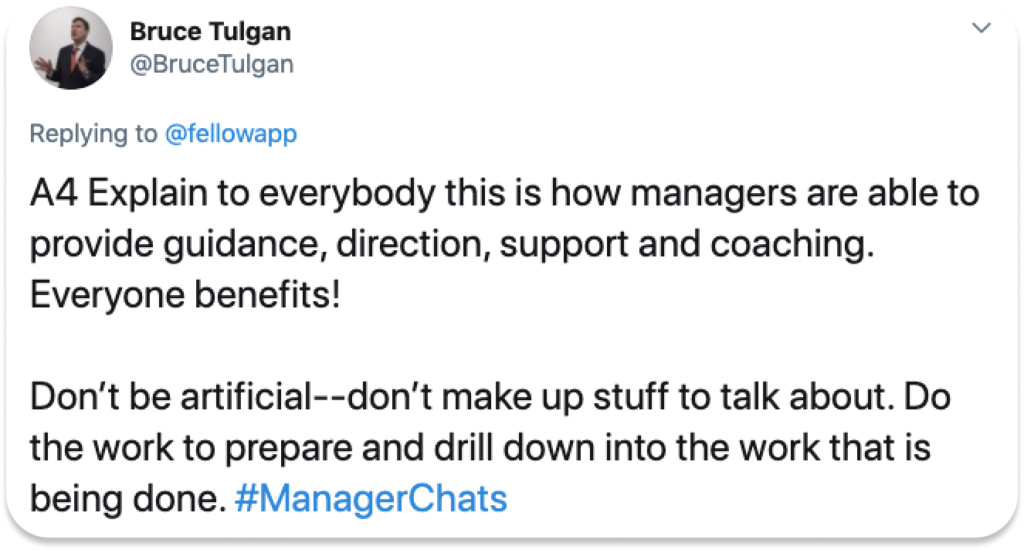
Finally, Brett Reed, Director of Talent and People a Localised, brings up a great point that most people who aren’t excited about having to take part in a one-on-one meeting haven’t had a good experience and need the value of the meeting to be crystal clear:
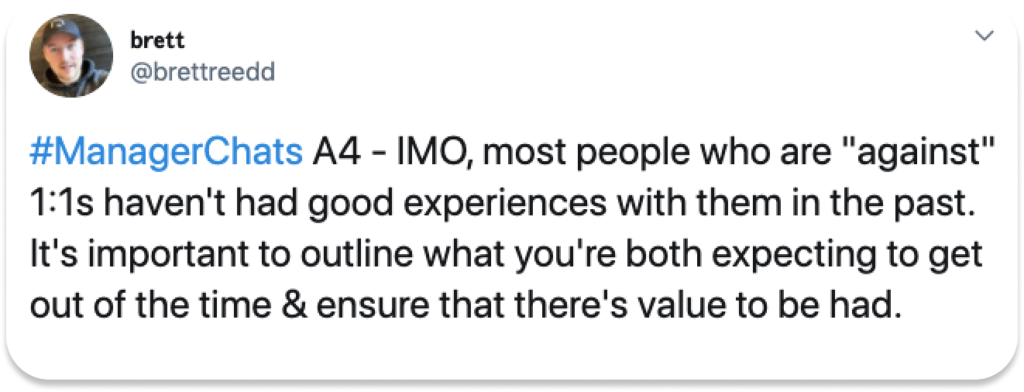
6 Talk about career development
Add career development as a topic for your one-on-one meeting checklist. Your one-on-one meetings are a great opportunity to talk about career development with your team members.
Steve Browne, Strategic HR professional and author, explains the importance of having an honest career conversation with your employees:
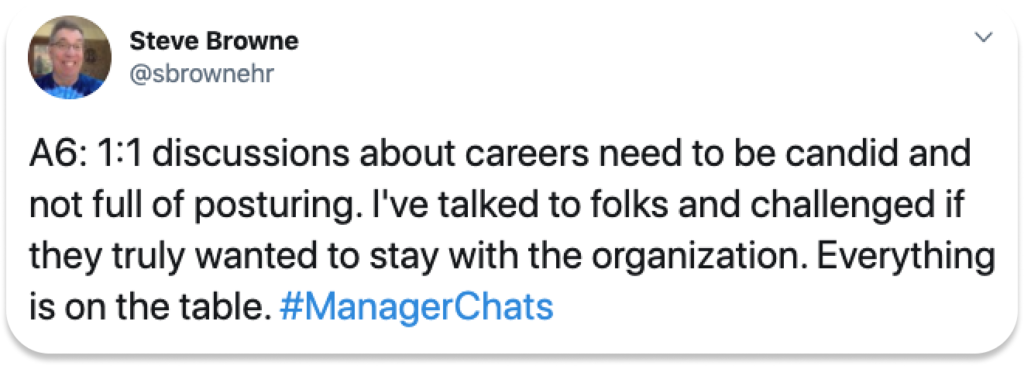
If you use your one-on-one meetings as an opportunity to create a stronger, more trusting relationship with your employees, they’re going to feel way more comfortable talking to you about their career.
Said Ketchman, Director of Engineering at the New York Times reiterates this idea:
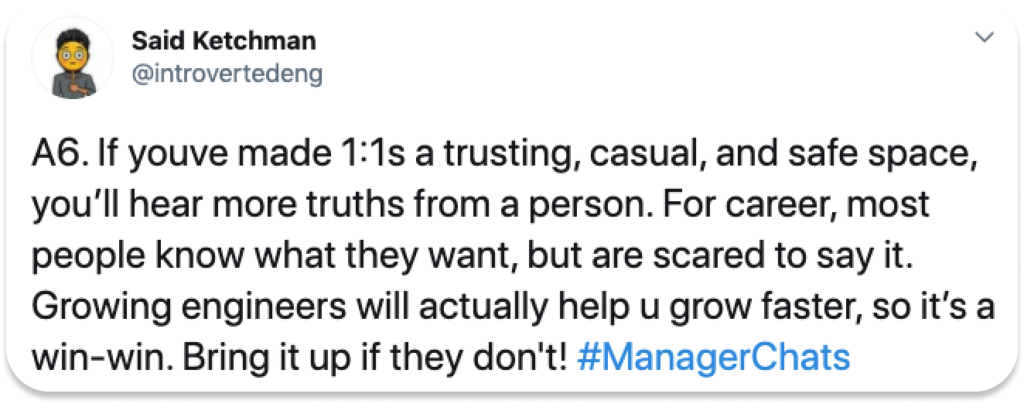
Jordan from Cave Social highlights the importance of making short-term and long term career development plans and how when the manager is aware of these plans, they can help you get there:
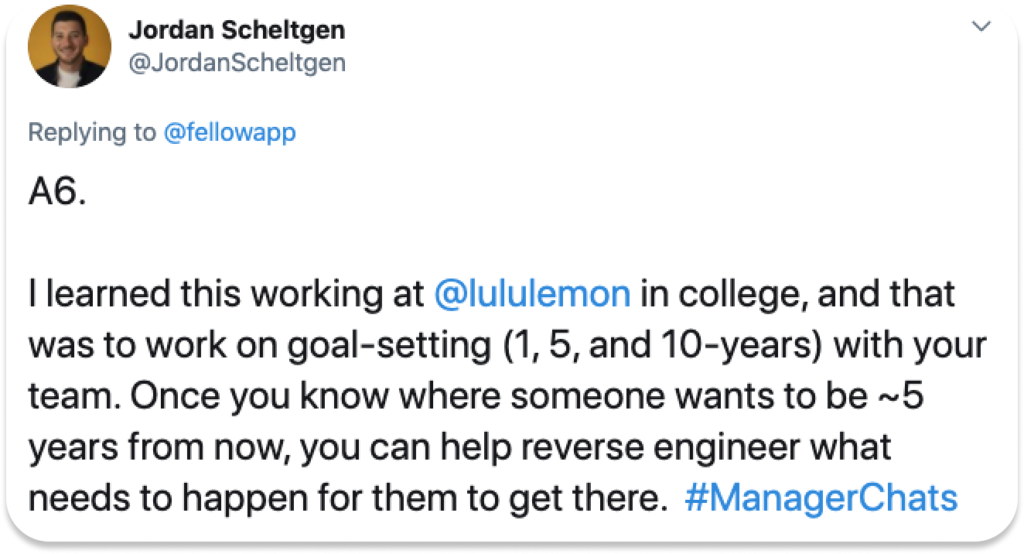
7 Don’t cancel or skip them
Another one of our one-on-one meeting best practices is: Don’t cancel or skip your one-on-one meetings! You are creating a rapport and showing your commitment to your team members every time you show up. This is a way of creating an honest, open and trusting relationship.
Executive coach, Jason Waller shares the single biggest mistake with one-on-ones:
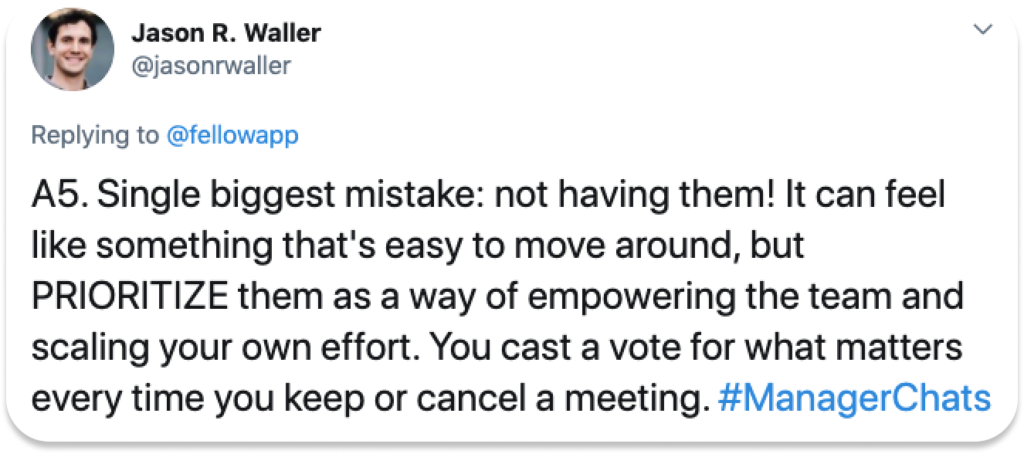
Bruce from RainmakerThinking agrees that cancelling or skipping these one-on-one meetings with direct reports just because “there’s nothing to talk about” is one of the most common mistakes managers make:
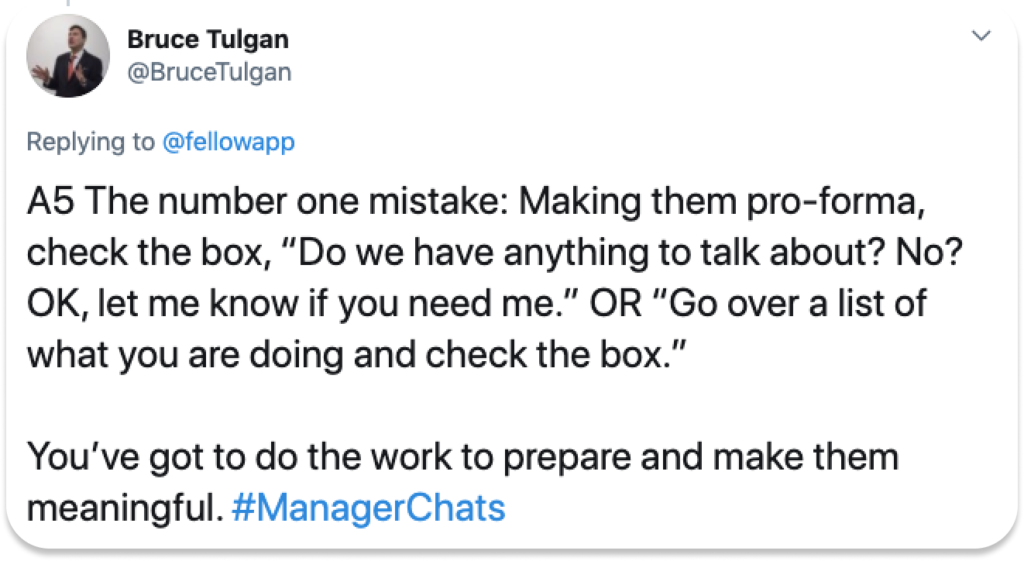
Finally, Nora Jenkins Townson, Founder of Bright + Early explains that managers should avoid cancelling their meetings at all costs because it creates the impression that the employee isn’t a priority:
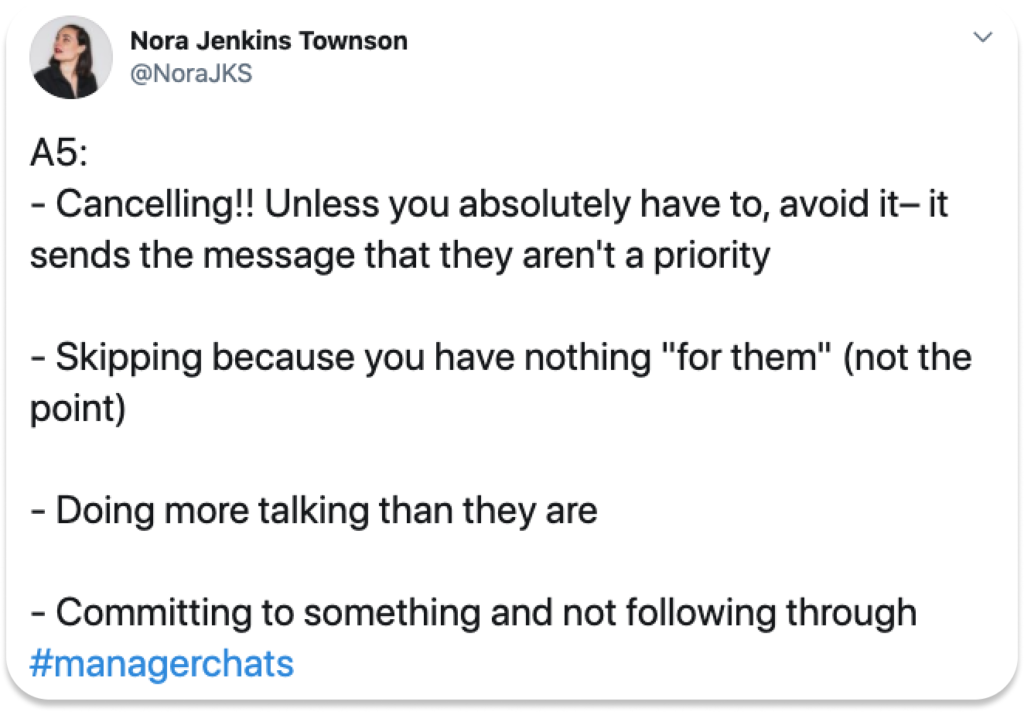
8 Empower your direct report to lead the conversation
It’s really important to empower your team members to lead the one-on-one meeting. This is a time that is dedicated to them and their well being and success at the organization. As a manager, you should be doing a lot more listening than talking in these meetings.
Alexandra Sunderland, our Engineering Manager at Fellow.app highlights the importance of letting your direct reports speak up and lead the conversation. Bobby Moore, Manager of Employer Brand at Loblaw Digital agrees that Managers shouldn’t be leading these types of discussions:
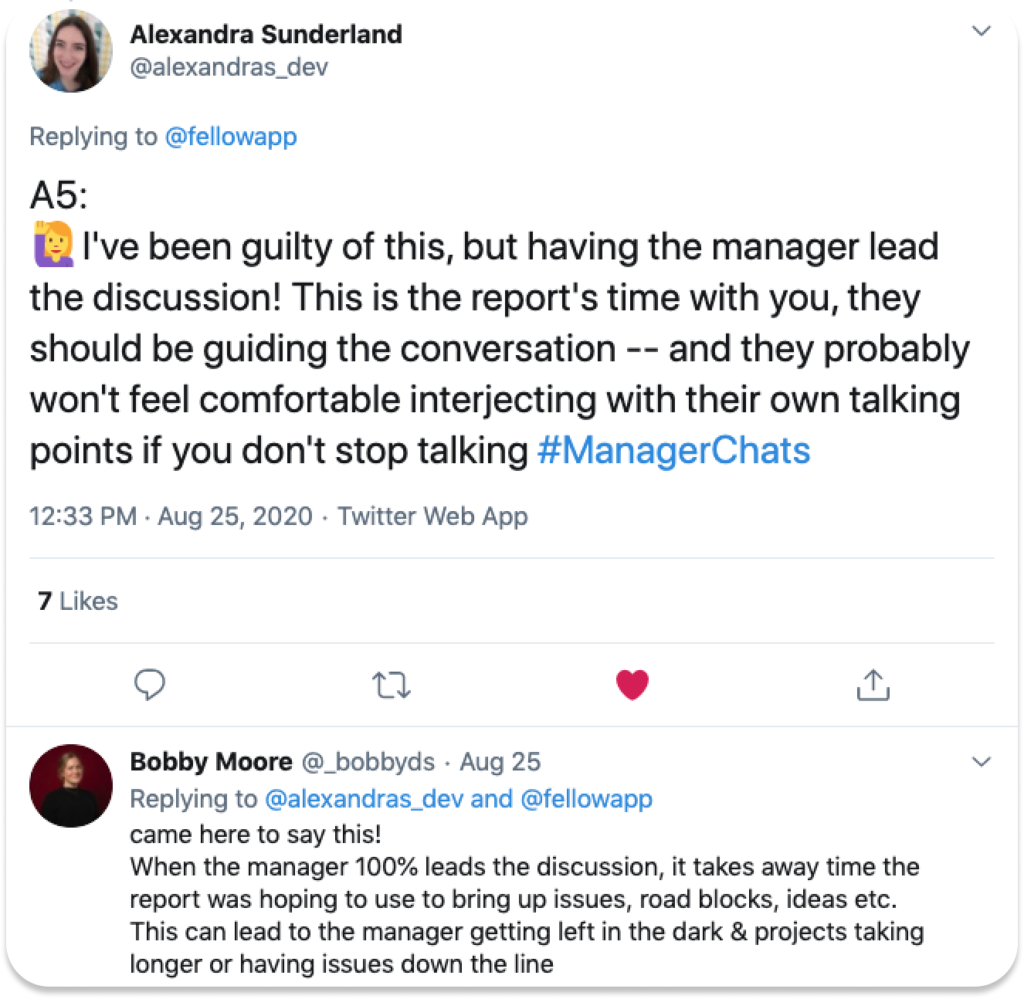
9 Share constructive feedback
It’s important that both you, as a manager, and as an employee, feel comfortable to share constructive feedback. Constructive feedback is going to give you something to work on and find some focus in an area where there is room for improvement. Executive Coach, Jason Waller shares more about the importance of one-on-one feedback:
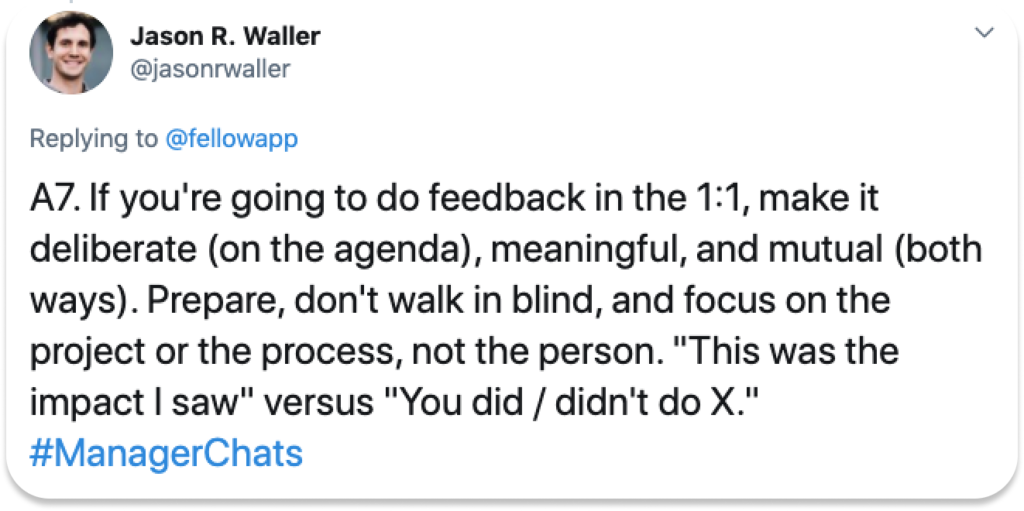
Danielle from Github goes so far as to structure her one-on-ones around career development, which means feedback is a crucial component to her one-on-one meetings:
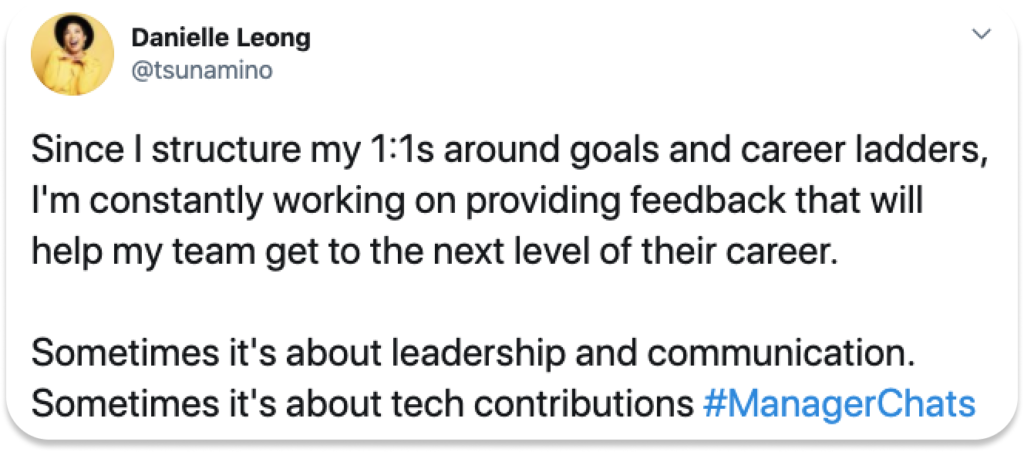
[Read: Danielle’s playbook for setting goals with your engineers that don’t completely suck]
Constructive feedback means being candid and honest with one another. Melissa from Context Leap touches on the importance of leading by example and cultivating trust between managers and their direct reports:
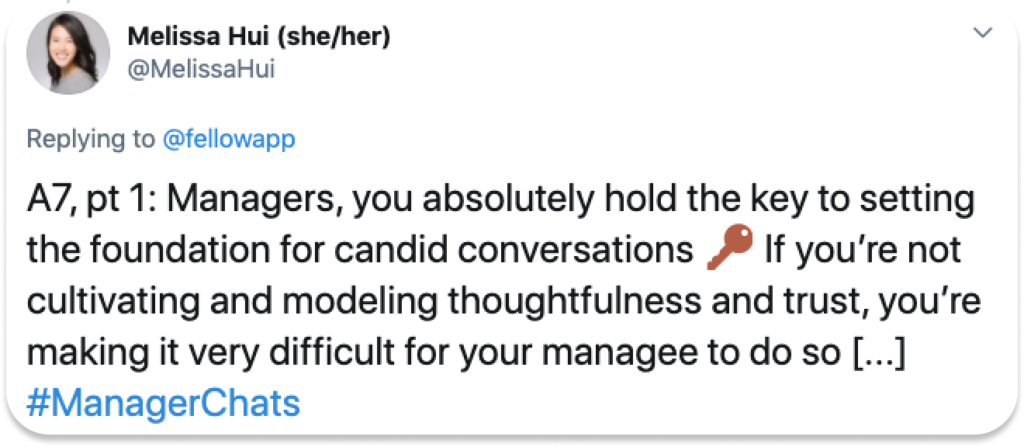
10 Leave every meeting with clear takeaways (and don’t forget to follow up!)
You want to leave every meeting with clear takeaways and a strong understanding of the areas you need to focus on. Reiterate these intents with your direct report to ensure they have a solid understanding and show them that you are there to support them. Said from the New York Times gives some valuable advice about how to have a more meaningful one-on-one:
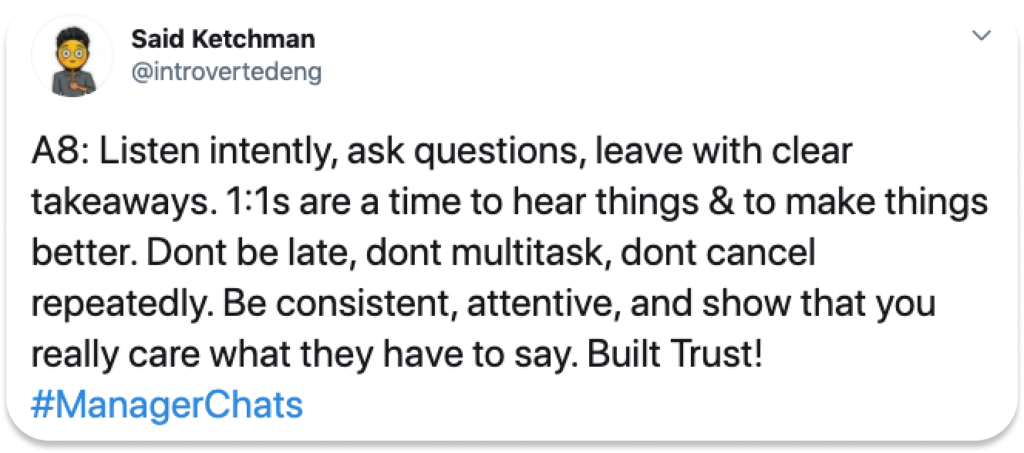
Finally, Erin Blaskie, our Director of Marketing at Fellow highlights the importance of following up on the goals that you set with your employees to monitor their progression and impact on the organization:
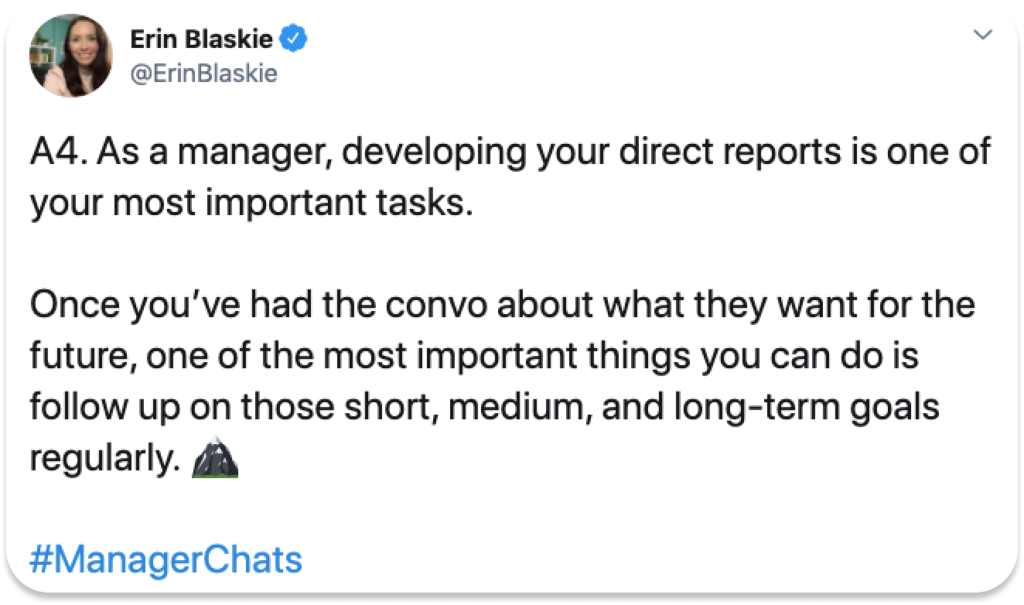
It’s not always easy to understand how to make one-on-one meetings more effective and meaningful, especially when each employee brings a unique approach, perspective and experience to the table. Refer back to these one-on-one meeting tips anytime you need a source of inspiration for a more meaningful meeting.
This concludes Fellow’s 10 one-on-one meeting best practices for effective meetings.
Until next time, thanks for following along our #ManagerChats!
![Status Meeting: 9 Best Practices For an Effective Meeting [+ Free Templates]](https://fellow.app/wp-content/uploads/2022/05/Status-Meetings-2.jpg)


![Quarterly Planning: Ultimate Guide for 2024 [+Free Template]](https://fellow.app/wp-content/uploads/2023/03/GUIDETO-QUARTERLY-PLANNING2.jpg)





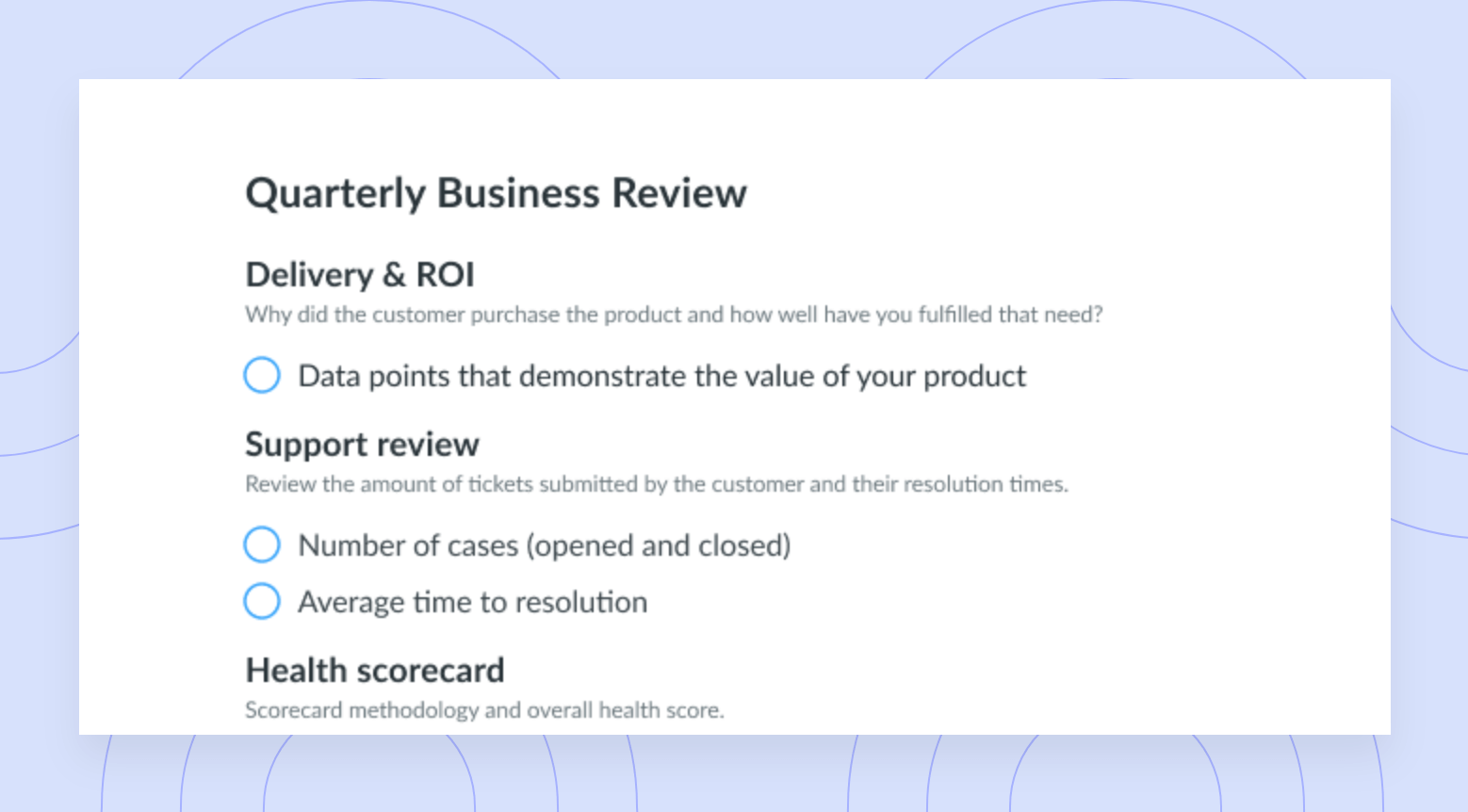
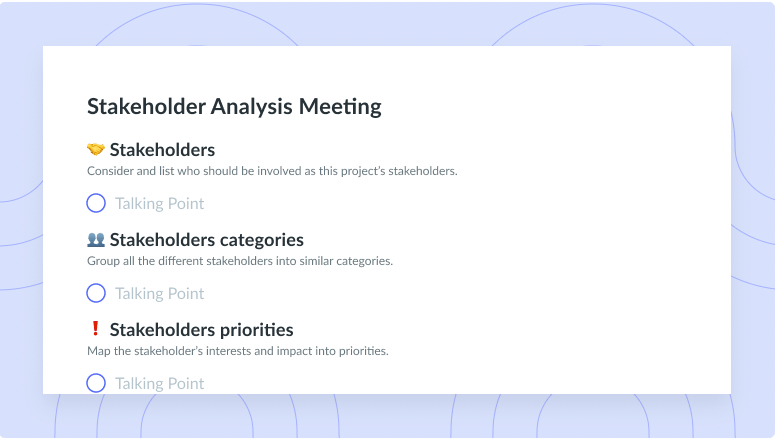
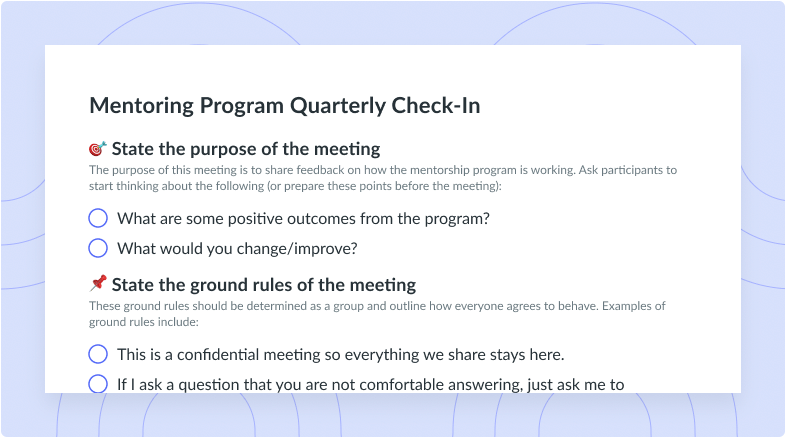
![What? So What? Now What? [Reflection Meeting] Template](https://fellow.app/wp-content/uploads/2021/08/What-So-What-Now-what-preview-v2.png)
